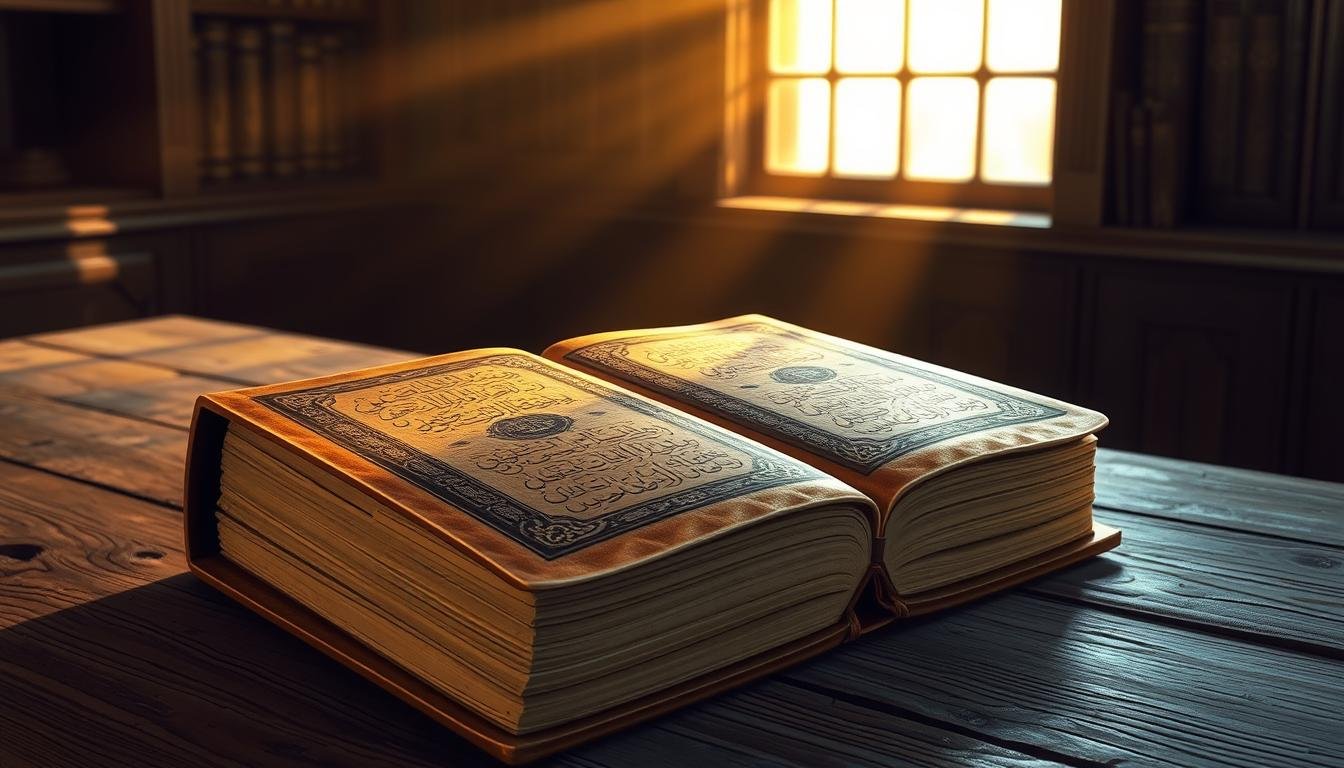I’ve always been curious about Islam’s view on music. When I looked into Sahih Bukhari, I found it’s more complex than I thought. It talks about people who accept four big sins, including music.
This made me want to learn more. I started to look into different views on music in Islam. I wanted to know its place in Muslim culture.
Thinking about the hadith on music in Bukhari made me think about its time. Music in Bukhari’s society mixed Persian, Turkic, and Islamic styles. It’s interesting to see how music has changed over time.
As we look into the hadith on music in Sahih Bukhari, we’ll see different views. We’ll also think about when it was written. This will help us understand Islam’s view on music better.
Understanding Sahih Bukhari’s Historical Context
Sahih Bukhari is a key part of Islamic literature. It’s a collection of hadiths that are very important. The hadith about music is part of a bigger discussion on what’s allowed in Islam.
Looking into Sahih Bukhari’s history helps us understand its value. Imam Bukhari worked hard to gather these hadiths. This shows us the importance of hadiths in Islamic teachings.
Reflecting on Sahih Bukhari’s role in Islamic literature is enlightening. It’s a collection that shows Islamic thought and practice. By studying its history, we learn more about its relevance today.
The Significance of Sahih Bukhari in Islamic Literature
Sahih Bukhari is very important in Islamic literature. It gives us a look into the Prophet Muhammad’s life and teachings. Its impact on Islamic thought and practice is huge.
Historical Context of Musical Traditions in Early Islamic Society
The history of music in early Islamic society is interesting. It’s closely linked to Sahih Bukhari’s hadith collection. When we look at the hadith about music, we must see it in the context of Islamic literature and society.
Methodology of Hadith Collection in Bukhari
Imam Bukhari’s method of collecting hadiths is impressive. He did it with great care. Understanding Sahih Bukhari’s history and its role in Islamic literature is key.
The Complete Hadith About Music in Bukhari
Exploring the Hadith about music in Bukhari shows it’s a deep topic. The Islamic perspective on music has many views. Looking at the Hadith’s words and setting helps us understand its meaning and music’s place in Muslim culture.
The Hadith from Sahih Bukhari (Hadith: 5590) says many will think music is okay. This change in view is also seen in Musnadul Bazzar. It talks about two sounds that are cursed, including music. Scholars like Ibn Hazm think music is okay, but others say it’s not.
To get the Hadith about music in Bukhari, we must look at its history and who told it. The Hadith comes in different forms. Some mention instruments, while others don’t. But, having many versions doesn’t make the Hadith less true.
Sayyiduna ‘Abdullah Ibn Mas’ud and Sayyiduna Abdullah Ibn ‘Abbas saw music in Surah Luqman, verse 6. This shows most scholars agree on this point. Their views help us understand music’s role in Islam.
In summary, the Hadith about music in Bukhari gives us important insights. It shows how complex and detailed the talk about music is. By studying the Hadith’s words, setting, and history, we learn more about its importance and music’s place in Muslim life.
Key Musical Instruments Mentioned in Bukhari’s Collections
Looking into the hadith about music in Bukhari, we see many musical instruments in Islam. These include drums, wind instruments, and string instruments. They are talked about in different ways, showing their importance in Islamic culture.
The hadith says some people will think musical instruments are okay, like other things that are not allowed. This shows a big change in how people see music. It’s key to understand the history and the different views in Islamic law.

When we look at wind instruments and string instruments in the hadith, we learn more about Islam’s view on music. By studying these instruments and their settings, we get a clearer picture of Islamic thought. We also see the ongoing debates about music and if it’s allowed.
Analyzing the Chain of Narration
When we look at the hadith about music in Bukhari, we must check the chain of narration. This chain shows who passed on the hadith from the Prophet Muhammad (peace be upon him) to us. It helps us understand the hadith better.
The chain of narration is key in hadith analysis. A strong chain means we can trust the hadith. But a weak chain makes us doubt it. So, we’ll look at the chain of the hadith about music in Bukhari.
By studying the chain of narration, we learn a lot about the hadith. We see how each narrator helped pass it down. This helps us understand the hadith’s importance today. As we keep exploring, we’ll learn more about Islamic teachings and values.
Contextual Understanding of Musical References
Exploring musical references in Islam shows us how important context is. The hadith about music in Bukhari has many references. These need a careful look at celebrations, military uses, and social events. This helps us understand music’s role in Muslim culture better.
In celebrations, music is seen as a way to express joy. For example, the Prophet Muhammad let Abyssinians sing and dance in the mosque. This shows music is okay in some situations.
In military contexts and social gatherings, music’s meaning can vary. Whether music is allowed depends on its content and purpose. Looking at these different settings helps us grasp the nuances of music in Islam.
Celebrations and Festivities
Celebrations are big in Muslim culture, and music is a key part. The Prophet’s welcome in Medina with music and song shows it’s okay in some cases.
Military and Battle Contexts
In war, music might boost morale. But, its use is open to debate. It depends on the situation.
Social Gatherings and Events
At social events, music’s role is also important. Aisha’s story in Sahih Bukhari makes a clear point. It’s about the difference between casual singing and something more.
Scholarly Interpretations Through the Ages
Exploring Scholarly interpretations of music in Islam shows us a long debate. Islamic scholars have discussed music’s place in Islam for centuries.
Islamic history is filled with Islamic scholars giving detailed views on the Quran and Hadith. They’ve talked about music’s role in Islamic culture. Schools like Hanafi and Shia have shared their own views, making the topic complex. These Scholarly interpretations help us understand music’s importance in Muslim culture.
The debate on music in Islam is ongoing, with new scholars adding their thoughts. This shows us that music’s connection to Islam is deep and varied. By looking at these Scholarly interpretations, we can better grasp music’s role in Islamic culture today.
Common Misunderstandings About Music in Bukhari
When we talk about music in Islam, many Misunderstandings about music in Islam come up. One big issue is translation issues that can confuse us. For example, “lahwa al-hadith” is often wrongly said to mean music. But it really means something more.
This shows how key it is to know the cultural context of these texts. It helps us understand them better.
A study on music during Ramadan found many Muslims unsure about music in this month. But, this doubt usually comes from Misunderstandings about music in Islam. Looking into translation issues and cultural context helps us see music’s place in Islam more clearly.
As we explore Islamic teachings on music, it’s vital to understand the cultural context and translation issues. They greatly affect how we see things.
The Intersection of Culture and Religious Understanding
Exploring Islamic views on music shows us how culture and religion meet. This meeting is not static but changes over time. It’s shaped by different places and new ways of doing things.
The bond between culture and religion is complex. It’s important to see how they affect each other in many ways.
In Islamic culture, where you are matters a lot. For example, Morocco has a special way of mixing religion and culture. They focus on being open and accepting. This mix comes from their Islamic, Arab, and Berber roots.
Today, Muslims face new challenges. They need to keep their faith while living in today’s world. This has led to fresh ideas in Islamic culture, including music. Looking at these new ideas helps us understand how culture and religion change together.
Modern Applications of Bukhari’s Musical Principles
Bukhari’s musical principles are not just for the past. They have modern uses that need careful thought. This is true for Muslims today, balancing old traditions with new life.
Looking at how Bukhari’s music rules apply today helps us understand Islam’s view on music. It shows how music fits into Muslim culture.
Bukhari’s music rules can shape modern life in many ways. This includes making new music instruments or songs that follow Islamic values. Guidelines for Muslims come from these rules. They help Muslims enjoy music in a way that respects their faith.
For instance, Muslims can use music to express themselves and be creative. But they must also think about how music affects their spiritual health.

In summary, Bukhari’s music rules open doors for Muslims to enjoy music in line with their faith. By following these guidelines and mixing old traditions with today’s life, Muslims can deepen their grasp of Islam’s music views. This enriches their lives.
Moving Forward: Bridging Classical Texts with Modern Understanding
Exploring the hadith about music in Bukhari shows us the need to bridge classical texts with modern understanding. This helps us understand the Islamic view better. By looking at history and how Islamic thought has changed, we learn more about music in Muslim culture.
The Islamic perspective on music changes over time and depends on the situation. To bridge classical texts with modern understanding, we must look at different views and uses of Islamic rules through history. This needs careful thought and analysis, mixing old knowledge with new insights.
This way, we can have a more open and informed talk about music in Islamic culture. Moving ahead, it’s key to see the value of modern understanding in making classical texts clearer. This helps us get a deeper understanding of the Islamic perspective and its importance today.
Conclusion: The Islamic Perspective on Music
The hadith about music in Sahih Bukhari give us a detailed look at the Islamic view on music. Some think the hadith lets us enjoy certain music types. But most scholars agree that music, like using instruments, is mostly banned (haram) in Islam.
Yet, the hadith talks about the duff (a drum) in a special way. It says the duff is okay in certain times, like during celebrations or to make announcements. But it doesn’t mean music is okay in general.
Looking at the hadith’s history and what scholars say helps us understand music’s place in Islam better. Whether music is allowed or not depends on the situation and why we’re listening to it. This helps Muslims find a balance between old traditions and today’s world. The teachings in Sahih Bukhari are key for figuring out the Islamic view on music.
FAQ
What is the historical context of the hadith about music in Sahih Bukhari?
What is the significance of Sahih Bukhari in Islamic literature?
What are the key musical instruments mentioned in Bukhari’s collections?
How can we analyze the chain of narration for the hadith about music in Bukhari?
What are the different contexts in which music is mentioned in the hadith?
How have Islamic scholars interpreted the hadith about music throughout the ages?
What are some common misunderstandings about the hadith on music in Bukhari?
How do cultural factors influence the interpretation of the hadith on music in Bukhari?
How can the principles from Bukhari’s hadith on music be applied in the modern context?
How can we bridge classical texts like Bukhari with modern understanding?

Embracing Faith, One Insight at a Time!
The teachings of the Quran have always guided my path. With a deep passion for Islamic knowledge, I strive to blend the wisdom of tradition with the relevance of today, making the timeless messages of Islam accessible and meaningful for everyone.
Muslim Culture Hub is my platform to share historical insights and thought-provoking articles, exploring both well-known and lesser-discussed aspects of Islamic culture and beliefs. My mission is to create an inclusive online space where everyone can learn, strengthen their faith, and connect with the profound message of Islam.
Join the journey!
May peace be upon you.








